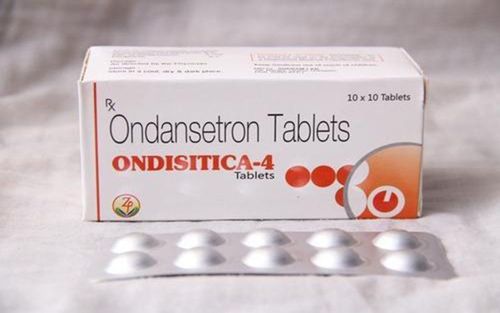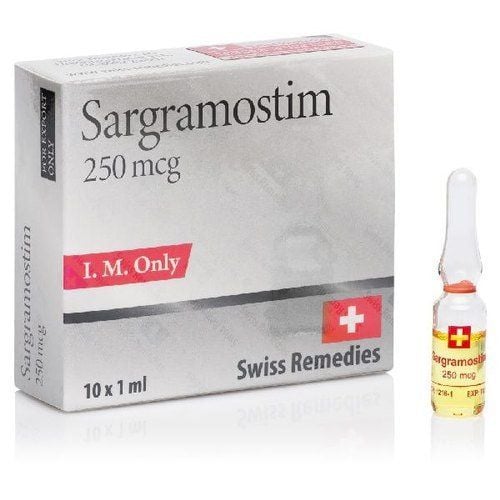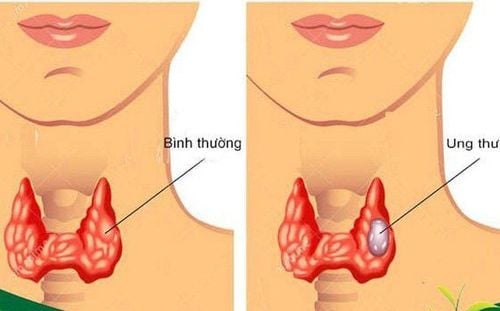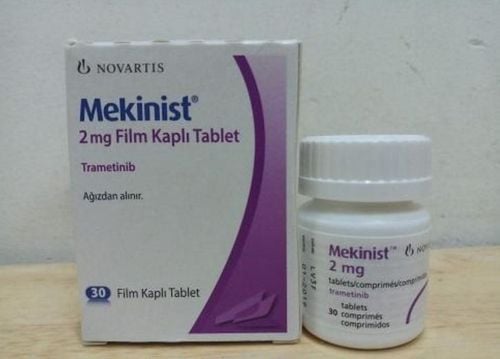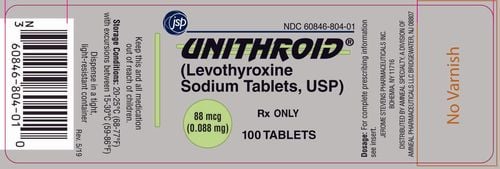This is an automatically translated article.
The article was written by Specialist Doctor I Nguyen Thi Minh Thuyen - Pathologist, Pathology Department - Vinmec Danang International General Hospital.
Mortality from thyroid cancer has decreased due to the increasing development of thyroid cancer diagnostic tools such as ultrasound and fine needle aspiration goiter, which can diagnose the disease from a very early stage. Early, second, the treatment of well-differentiated thyroid cancer is very effective.
C. HORMONE THEAPY TREATMENT
If the thyroid gland has been removed, the body can no longer make thyroid hormone, so you will need to take thyroid hormone medication (levothyroxine) to replace the natural hormone and help maintain a normal metabolism and May reduce the risk of cancer coming back.
Normal thyroid function is regulated by the pituitary gland. The pituitary gland produces a hormone called TSH that causes the thyroid gland to produce thyroid hormone for the body. TSH also promotes the growth of thyroid and possibly thyroid cancer cells. TSH levels, which are regulated by blood levels of thyroid hormone. If thyroid hormone levels drop low, the pituitary gland produces more TSH. If thyroid hormone levels are elevated, the pituitary gland produces less TSH.
Therefore, doctors understand that by giving a higher than normal dose of thyroid hormone, TSH levels can be kept very low, possibly slowing the growth of any remaining cancer cells and reduces the risk of recurrence of some thyroid cancers (especially high-risk cancers).
Possible side effects
Taking thyroid hormones higher than normal seems to have few short-term side effects, but some doctors are concerned about taking them long-term.
High levels of thyroid hormone can lead to problems like a fast or irregular heartbeat. Over the long term, high doses of thyroid hormone can also lead to weak bones (osteoporosis). Therefore, doctors generally avoid taking high doses of thyroid hormone unless you have differentiated thyroid cancer and are at high risk of recurrence.
D. EXTERNAL BEAM RADIATION THERAPY
External radiation therapy uses high-energy rays to kill cancer cells or slow their growth. A focused beam of radiation is delivered from a machine outside the body. External radiation therapy is often indicated for the treatment of cancers that do not absorb iodine, such as medullary and anaplastic cancers that have spread outside the thyroid gland. For cancers that take up iodine (most differentiated thyroid cancers), radioactive iodine therapy is usually better.
If the cancer does not respond to radioactive iodine therapy, external radiation therapy may be used to treat cancer that has recurred in the neck or has spread to distant sites that cause pain or other symptoms.
External radiation therapy is usually given 5 days a week for several weeks. Before starting, the treatment team will take careful measurements to find the correct angles to aim the radiation beam and determine the proper dose of radiation. The treatment itself is painless and closely resembles a regular X-ray. Each treatment only lasts a few minutes, although it takes time to plan and prepare to get you into the treatment position.
Possible side effects
The main limitation of this treatment is that the radiation can destroy nearby healthy tissue along with cancer cells.
Some patients experience skin changes such as burns, pigmentation like sunburn, but these changes will gradually disappear. Difficulty swallowing, dry mouth, hoarseness and fatigue. To reduce the risk of side effects, doctors carefully determine the exact dose needed and aim the beam as precisely as possible to hit the target.

E. Chemotherapy
Chemotherapy is the use of anti-cancer drugs intravenously or orally. Chemotherapy is systemic therapy, which means that the drug enters the bloodstream and travels throughout the body to reach and destroy cancer cells.
Chemotherapy is rarely helpful for most thyroid cancers; it is often combined with external radiation therapy to treat undifferentiated thyroid cancer and some other advanced cancers that have not responded to other treatments. other treatment.
The most commonly used chemotherapy drugs to treat mainly medullary thyroid cancer and undifferentiated thyroid cancer include:
Dacarbazine Vincristine Cyclophosphamide Doxorubicin Streptozocin Fluorouracil Paclitaxel Docetaxel Carboplatin Possible side effects The drug attacks rapidly dividing cells, is the mechanism of action against cancer cells. But other cells in the body, like those in the bone marrow, lining of the mouth, intestines, and hair follicles, also divide rapidly. These cells are also likely to be affected by chemotherapy, which can lead to side effects.
Side effects of chemotherapy depend on the type, dose and duration of the drug, and include:
Hair loss Mouth ulcers Loss of appetite Nausea and vomiting Diarrhea Increased chance of infection (due to decreased white blood cell count) platelets) Easy bruising or bleeding (due to decreased platelet count) Fatigue (due to decreased red blood cell count)
These side effects are usually short-term and go away after treatment ends. Some chemotherapy drugs may have special effects that require monitoring. For example, doxorubicin can affect heart function. If you are taking doxorubicin, your doctor will check your heart regularly with tests such as an echocardiogram.
F. TARGET THERAPY
Are newer drugs that specifically target changes inside cancer cells.
1. Drugs Targeting Papillary or Follicular Thyroid Cancer Fortunately, most of these cancers can be effectively treated with surgery and radioactive iodine therapy, so there is little need for drugs. other. But when these treatments don't work, targeted drugs can help.
Kinase inhibitors
Sorafenib (Nexavar) and lenvatinib (Lenvima), which inhibit protein kinases in 2 ways: helping to stop tumors from forming new blood vessels needed for tumors to grow, and targeting certain proteins produced by cancer cells.
Oral administration Common side effects: fatigue, rash, loss of appetite, diarrhea, nausea, high blood pressure, and limb syndrome (redness, pain, swelling or blistering in the palms or soles) foot). RET Inhibitors
In some papillary and follicular thyroid cancers, cells have certain changes in the RET gene that cause them to produce abnormalities from the RET kinase protein, which helps cells grow .
Selpercatinib (Retevmo) is a RET inhibitor, which works by attacking the RET protein
Taken by mouth as a capsule, usually twice a day. Common side effects of Selpercatinib: Dry mouth, diarrhea, constipation, high blood pressure, feeling tired, swelling in your hands or feet, skin rash, high blood sugar, low white blood cells or blood platelets, and some changes in other blood tests. Less common but more serious side effects can be liver damage, allergic reactions, changes in heart rate, easy bleeding, and problems with wound healing. NTRK inhibitors
A small number of thyroid cancers have changes in one of the NTRK genes, which can help cancer cells grow.
Larotrectinib (Vitrakvi) and Entrectinib (Rozlytrek) target and neutralize abnormal proteins produced by the NTRK genes
The drug is taken as a pill, once or twice a day. Common side effects: dizziness, fatigue, nausea, vomiting, constipation, weight gain, and diarrhea. Less common but more serious side effects can include liver damage, heart problems, confusion, and other nervous system problems.

Kinase inhibitors
Vandetanib (Capreba) and cabozantinib (Cometriq) are kinase inhibitors that can affect both cancer cells and the growth of new blood vessels.
Tablets, taken once a day Some common side effects of Vandetanib include diarrhea, rash, nausea, high blood pressure, headache, fatigue, loss of appetite, and stomach upset. Rarely, can cause serious problems with heart rhythm and infection that can lead to death. Because of its potential side effects, doctors must receive special training before they are allowed to prescribe this drug. Common side effects of cabozantinib include diarrhea, constipation, abdominal pain, mouth sores, decreased appetite, nausea, weight loss, fatigue, high blood pressure, hair loss, and limb syndrome ( redness, pain, and swelling of the hands and feet). Rarely, this medicine can also cause serious side effects, such as severe bleeding and bowel perforation. RET Inhibitors
In some medullary thyroid cancers, cells have certain changes in the RET gene that cause them to produce abnormalities from the RET kinase protein. This abnormal protein helps cells grow.
Selpercatinib (Retevmo) are medicines known as RET inhibitors, which work by attacking the RET protein.
Take orally as a capsule, usually twice a day. Common side effects of selpercatinib may be dry mouth, diarrhea, constipation, high blood pressure, feeling tired, swelling in the hands or feet, skin rash, high blood sugar, low white blood cells or white blood cells. blood platelets and changes in some other blood tests. 3. Targeted drugs for undifferentiated thyroid cancer Doctors have been very interested in finding targeted drugs for the treatment of undifferentiated (anaplastic) thyroid cancer because of most of the treatment methods. Other treatments are not effective for these cancers.
BRAF and MEK inhibitors
Some undifferentiated thyroid cancers have changes in the BRAF gene that cause them to make proteins that help the cancer grow.
Dabrafenib (Tafinlar) and Trametinib (Mekinist) are drugs that target some of these proteins
These drugs are taken as a tablet or capsule every day. Common side effects may be skin changes, rash, itching, sensitivity to the sun, headache, fever, chills, joint or muscle pain, fatigue, cough, hair loss, nausea, diarrhea and high blood pressure. Less common but serious side effects may include bleeding, heart rhythm problems, liver, kidney, or lung problems, severe allergic reactions, and serious skin or eye problems and increased blood sugar. RET inhibitor
In some undifferentiated thyroid cancers, cells have certain changes in the RET gene that cause them to produce abnormalities from the RET kinase protein. This abnormal protein helps cells grow.
Selpercatinib (Retevmo) is a medicine known as a RET inhibitor. It works by attacking the RET protein.
Take orally as a capsule, usually twice a day. Common side effects may include dry mouth, diarrhea, constipation, high blood pressure, feeling tired, swelling in the hands or feet, skin rash, high blood sugar, low white blood cells or urination. blood counts and changes in certain other blood tests. Less common but more serious side effects can include liver damage, allergic reactions, changes in heart rate, easy bleeding, and problems with wound healing.
NTRK inhibitors
A small number of cases of undifferentiated thyroid cancer have changes in one of the NTRK genes. These gene changes can help cancer cells grow
Larotrectinib (Vitrakvi) and Entrectinib (Rozlytrek) which are drugs that target protein abnormalities produced by the NTRK gene.
Tablets, taken once or twice a day Common side effects include fatigue, nausea, vomiting, dizziness, constipation, weight loss, and diarrhea. Less common but more serious side effects can be liver damage, heart and nervous system problems. Vinmec Hospital is an international standard hospital in terms of service and quality with JCI certification to ensure maximum patient safety. The hospital has a full range of facilities for diagnosis and surgical treatment of thyroid cancer diseases, with a team of dedicated medical staff, oncologists specializing in head, neck and thyroid surgery for many years. experience.
For common cases of thyroid cancer surgery, the patient only needs to stay in the hospital for one night, the patient quickly recovers to be able to be discharged home safely.
If you have a need for consultation and examination at Vinmec Hospitals of the national health system, please book an appointment on the website (vinmec.com) for service.
Please dial HOTLINE for more information or register for an appointment HERE. Download MyVinmec app to make appointments faster and to manage your bookings easily.
Article referenced source: American Cancer Society




